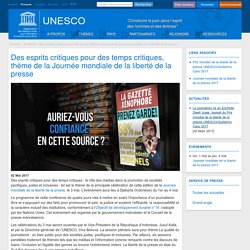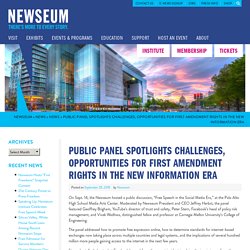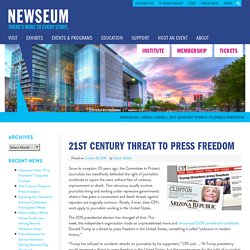

Des esprits critiques pour des temps critiques, thème de la Journée mondiale de la liberté de la presse. Des esprits critiques pour des temps critiques : le rôle des médias dans la promotion de sociétés pacifiques, justes et inclusives : tel est le thème de la principale célébration de cette édition de la Journée mondiale de la liberté de la presse, le 3 mai.

L’événement aura lieu à Djakarta (Indonésie) du 1er au 4 mai. Le programme de cette conférence de quatre jours vise à mettre en avant l’importance d’un journalisme libre et s’appuyant sur des faits pour promouvoir la paix, la justice et soutenir l’efficacité, la responsabilité et la caractère inclusif des institutions, conformément à l’Objectif de développement durable n°16 (link is external)adopté par les Nations Unies. Cet événement est organisé par le gouvernement indonésien et le Conseil de la presse indonésienne. Les célébrations du 3 mai seront ouvertes par le Vice-Président de la République d’Indonésie, Jusuf Kalla, et par la Directrice générale de l’UNESCO, Irina Bokova. C'est quoi la liberté d'expression ? - Des enfants interrogent un professionnel des médias. Liberté d'expression : Les médias français sont-ils si libres ?
Public panel spotlights challenges, opportunities for First Amendment rights in the new information era. On Sept. 14, the Newseum hosted a public discussion, “Free Speech in the Social Media Era,” at the Palo Alto High School Media Arts Center.

Moderated by Newseum President and CEO Jeffrey Herbst, the panel featured Geoffrey Brigham, YouTube’s director of trust and safety, Peter Stern, Facebook’s head of policy risk management, and Vivek Wadhwa, distinguished fellow and professor at Carnegie Mellon University’s College of Engineering. The panel addressed how to promote free expression online, how to determine standards for internet-based exchanges now taking place across multiple countries and legal systems, and the implications of several hundred million more people gaining access to the internet in the next few years. Stern also talked about what Facebook learned from the recent incident involving the iconic image from the Vietnam War, “Napalm Girl,” which Facebook initially removed due to the nudity in the photo but later reinstated after much criticism.
Share. 21st Century Threat to Press Freedom. Since its inception 35 years ago, the Committee to Protect Journalists has steadfastly defended the right of journalists worldwide to report the news without fear of violence, imprisonment or death.

That advocacy usually involves journalists living and working under repressive governments where a free press is nonexistent and death threats against reporters are tragically common. Rarely, if ever, does CPJ’s work apply to journalists working in the United States. The 2016 presidential election has changed all that. This week, the independent organization made an unprecedented move and renounced GOP presidential candidate Donald Trump as a threat to press freedom in the United States, something it called “unknown in modern history.” Since its endorsement of Hillary Clinton in September, the Arizona Republic has become an unlikely victim of the very reprisals that CPJ works so hard to prevent. “To all of you who asked why we endorsed — or what right we had to do so — I give you my mother.
MOOC DIYEMI - Semaine 2 - Liberté d'expression. INA : Parcours, la liberté de la presse. Parcours.